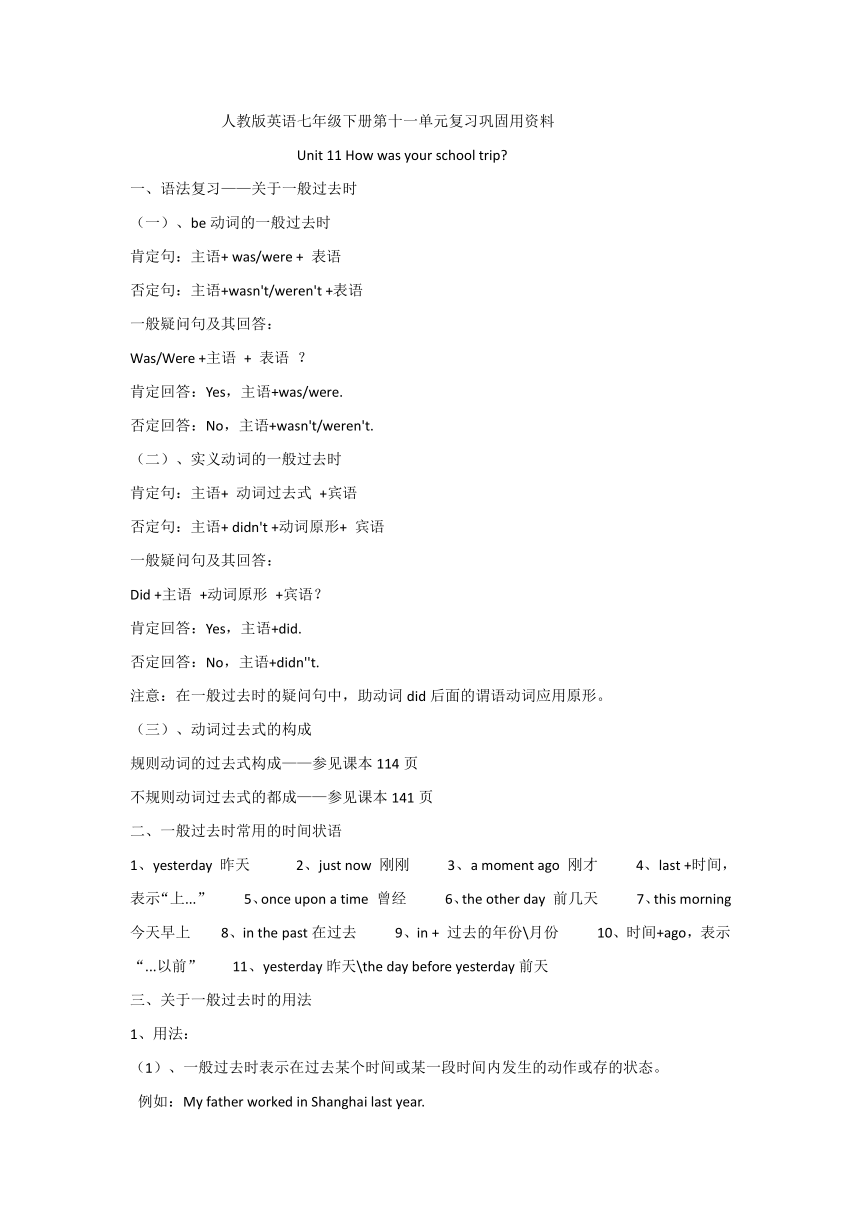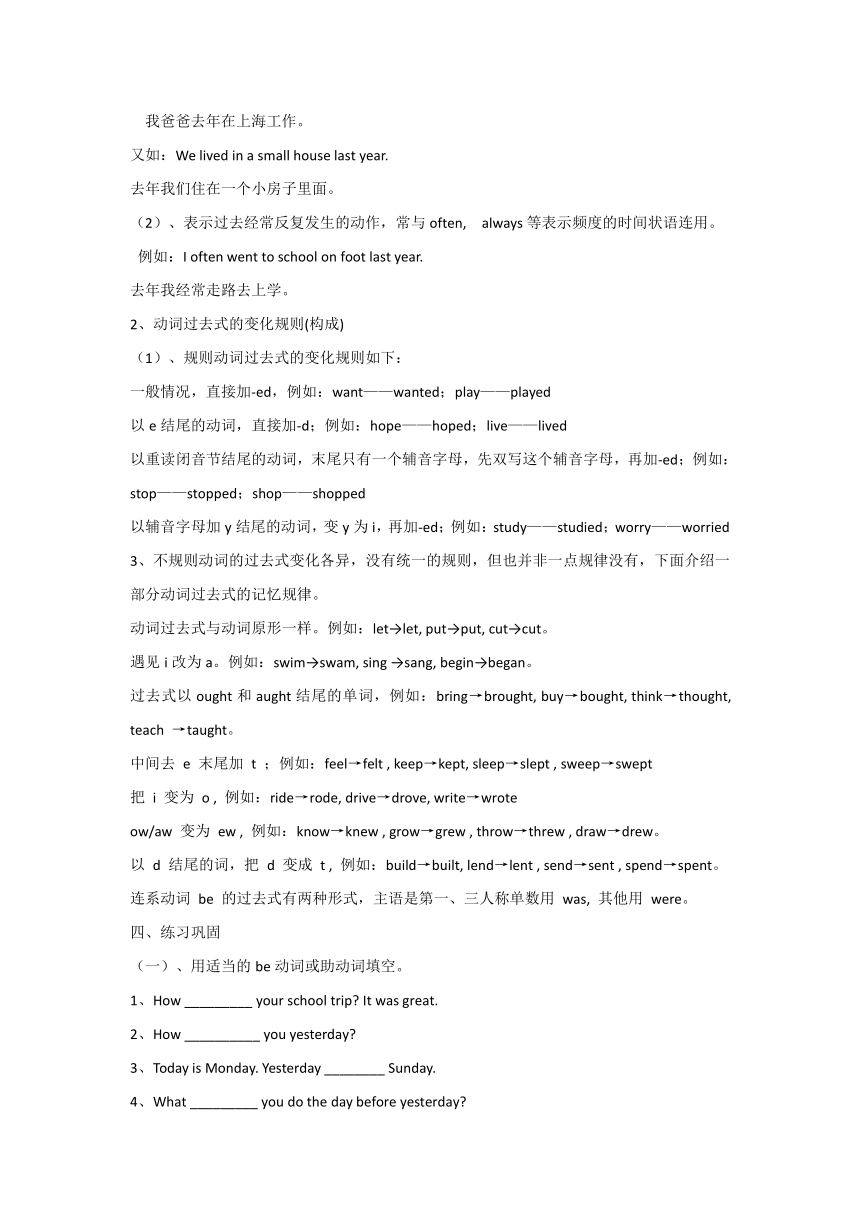人教版英语七年级下册Unit 11 How was your school trip?复习巩固学案(含答案)
文档属性
| 名称 | 人教版英语七年级下册Unit 11 How was your school trip?复习巩固学案(含答案) |  | |
| 格式 | docx | ||
| 文件大小 | 16.2KB | ||
| 资源类型 | 教案 | ||
| 版本资源 | 人教新目标(Go for it)版 | ||
| 科目 | 英语 | ||
| 更新时间 | 2024-06-20 12:24:43 | ||
图片预览


文档简介
人教版英语七年级下册第十一单元复习巩固用资料
Unit 11 How was your school trip
语法复习——关于一般过去时
、be动词的一般过去时
肯定句:主语+ was/were + 表语
否定句:主语+wasn't/weren't +表语
一般疑问句及其回答:
Was/Were +主语 + 表语 ?
肯定回答:Yes,主语+was/were.
否定回答:No,主语+wasn't/weren't.
、实义动词的一般过去时
肯定句:主语+ 动词过去式 +宾语
否定句:主语+ didn't +动词原形+ 宾语
一般疑问句及其回答:
Did +主语 +动词原形 +宾语?
肯定回答:Yes,主语+did.
否定回答:No,主语+didn''t.
注意:在一般过去时的疑问句中,助动词did后面的谓语动词应用原形。
、动词过去式的构成
规则动词的过去式构成——参见课本114页
不规则动词过去式的都成——参见课本141页
一般过去时常用的时间状语
yesterday 昨天 2、just now 刚刚 3、a moment ago 刚才 4、last +时间,表示“上...” 5、once upon a time 曾经 6、the other day 前几天 7、this morning 今天早上 8、in the past在过去 9、in + 过去的年份\月份 10、时间+ago,表示“...以前” 11、yesterday昨天\the day before yesterday前天
关于一般过去时的用法
1、用法:
(1)、一般过去时表示在过去某个时间或某一段时间内发生的动作或存的状态。
例如:My father worked in Shanghai last year.
我爸爸去年在上海工作。
又如:We lived in a small house last year.
去年我们住在一个小房子里面。
(2)、表示过去经常反复发生的动作,常与often, always等表示频度的时间状语连用。
例如:I often went to school on foot last year.
去年我经常走路去上学。
2、动词过去式的变化规则(构成)
(1)、规则动词过去式的变化规则如下:
一般情况,直接加-ed,例如:want——wanted;play——played
以e结尾的动词,直接加-d;例如:hope——hoped;live——lived
以重读闭音节结尾的动词,末尾只有一个辅音字母,先双写这个辅音字母,再加-ed;例如:stop——stopped;shop——shopped
以辅音字母加y结尾的动词,变y为i,再加-ed;例如:study——studied;worry——worried
3、不规则动词的过去式变化各异,没有统一的规则,但也并非一点规律没有,下面介绍一部分动词过去式的记忆规律。
动词过去式与动词原形一样。例如:let→let, put→put, cut→cut。
遇见i改为a。例如:swim→swam, sing →sang, begin→began。
过去式以ought和aught结尾的单词,例如:bring→brought, buy→bought, think→thought, teach →taught。
中间去 e 末尾加 t ;例如:feel→felt , keep→kept, sleep→slept , sweep→swept
把 i 变为 o , 例如:ride→rode, drive→drove, write→wrote
ow/aw 变为 ew , 例如:know→knew , grow→grew , throw→threw , draw→drew。
以 d 结尾的词,把 d 变成 t , 例如:build→built, lend→lent , send→sent , spend→spent。
连系动词 be 的过去式有两种形式,主语是第一、三人称单数用 was, 其他用 were。
练习巩固
、用适当的be动词或助动词填空。
1、How _________ your school trip It was great.
2、How __________ you yesterday
3、Today is Monday. Yesterday ________ Sunday.
4、What _________ you do the day before yesterday
5、__________ you ride a horse last week
6、________ he see any cows on the farm Yes, he did.
7、Did he milk a cow on the farm No, he __________.
8、Were the strawberries good Yes, they _________.
参考答案:
was 2、were 3、was 4、did 5、Did 6、did 7、didn’t 8、were
句子突破
Did you see any cows Yes, I did. I saw quite a lot.
注意短语:quiet a lot相当多,quiet a lot + of + 可数或不可数, 也可以单独使用。
2、After that, I went to the gift shop and bought some lovely gifts for my parents.
那之后,我去了礼物店为我的父母买了一些可爱的礼物。
注意短语:buy sth. for sb.= buy sb. sth. 为某人买某物
3、Everything was about robots and I’m not interested in that.
每个事物都是关于机器人的,我对此不感兴趣。
be interested in 对……感兴趣
例如:我们对英语感兴趣。We are interested in English.
辨析:interested\interesting
短语记忆:be(become) interested in sth/doing sth..
短语记忆:take an interest in sth/doing sth. 对……感兴趣
注意:interesting事物本身有趣可作定语和表语,主语是物或修饰物。
例如:I'm interested in playing basketball.
我对打篮球感兴趣。
又如:The game is really interesting.
这个游戏真的很有趣。
练习巩固:——用interesting / interested 填空。
(1)、The book is very _________. Most of the teachers are _________in it.
(2)、The boy has much _________ in drawing.
(3)、3岁的时候,他开始对音乐产生了兴趣。
He ______ _________ _______music when he was 3 years old.
参考答案:
(1)、interesting ; interested (2)、interested (3)、was ; interested ; in
4、it was difficult to take photos,...
it's +adj. + to do sth 做某事怎么样...
例如:It's easy to study English. 学习英语是很容易的。
I didn’t like the trip at all.
我一点都不喜欢这次行程。
not at all / not… at all 根本不、完全不
Unit 11 How was your school trip
语法复习——关于一般过去时
、be动词的一般过去时
肯定句:主语+ was/were + 表语
否定句:主语+wasn't/weren't +表语
一般疑问句及其回答:
Was/Were +主语 + 表语 ?
肯定回答:Yes,主语+was/were.
否定回答:No,主语+wasn't/weren't.
、实义动词的一般过去时
肯定句:主语+ 动词过去式 +宾语
否定句:主语+ didn't +动词原形+ 宾语
一般疑问句及其回答:
Did +主语 +动词原形 +宾语?
肯定回答:Yes,主语+did.
否定回答:No,主语+didn''t.
注意:在一般过去时的疑问句中,助动词did后面的谓语动词应用原形。
、动词过去式的构成
规则动词的过去式构成——参见课本114页
不规则动词过去式的都成——参见课本141页
一般过去时常用的时间状语
yesterday 昨天 2、just now 刚刚 3、a moment ago 刚才 4、last +时间,表示“上...” 5、once upon a time 曾经 6、the other day 前几天 7、this morning 今天早上 8、in the past在过去 9、in + 过去的年份\月份 10、时间+ago,表示“...以前” 11、yesterday昨天\the day before yesterday前天
关于一般过去时的用法
1、用法:
(1)、一般过去时表示在过去某个时间或某一段时间内发生的动作或存的状态。
例如:My father worked in Shanghai last year.
我爸爸去年在上海工作。
又如:We lived in a small house last year.
去年我们住在一个小房子里面。
(2)、表示过去经常反复发生的动作,常与often, always等表示频度的时间状语连用。
例如:I often went to school on foot last year.
去年我经常走路去上学。
2、动词过去式的变化规则(构成)
(1)、规则动词过去式的变化规则如下:
一般情况,直接加-ed,例如:want——wanted;play——played
以e结尾的动词,直接加-d;例如:hope——hoped;live——lived
以重读闭音节结尾的动词,末尾只有一个辅音字母,先双写这个辅音字母,再加-ed;例如:stop——stopped;shop——shopped
以辅音字母加y结尾的动词,变y为i,再加-ed;例如:study——studied;worry——worried
3、不规则动词的过去式变化各异,没有统一的规则,但也并非一点规律没有,下面介绍一部分动词过去式的记忆规律。
动词过去式与动词原形一样。例如:let→let, put→put, cut→cut。
遇见i改为a。例如:swim→swam, sing →sang, begin→began。
过去式以ought和aught结尾的单词,例如:bring→brought, buy→bought, think→thought, teach →taught。
中间去 e 末尾加 t ;例如:feel→felt , keep→kept, sleep→slept , sweep→swept
把 i 变为 o , 例如:ride→rode, drive→drove, write→wrote
ow/aw 变为 ew , 例如:know→knew , grow→grew , throw→threw , draw→drew。
以 d 结尾的词,把 d 变成 t , 例如:build→built, lend→lent , send→sent , spend→spent。
连系动词 be 的过去式有两种形式,主语是第一、三人称单数用 was, 其他用 were。
练习巩固
、用适当的be动词或助动词填空。
1、How _________ your school trip It was great.
2、How __________ you yesterday
3、Today is Monday. Yesterday ________ Sunday.
4、What _________ you do the day before yesterday
5、__________ you ride a horse last week
6、________ he see any cows on the farm Yes, he did.
7、Did he milk a cow on the farm No, he __________.
8、Were the strawberries good Yes, they _________.
参考答案:
was 2、were 3、was 4、did 5、Did 6、did 7、didn’t 8、were
句子突破
Did you see any cows Yes, I did. I saw quite a lot.
注意短语:quiet a lot相当多,quiet a lot + of + 可数或不可数, 也可以单独使用。
2、After that, I went to the gift shop and bought some lovely gifts for my parents.
那之后,我去了礼物店为我的父母买了一些可爱的礼物。
注意短语:buy sth. for sb.= buy sb. sth. 为某人买某物
3、Everything was about robots and I’m not interested in that.
每个事物都是关于机器人的,我对此不感兴趣。
be interested in 对……感兴趣
例如:我们对英语感兴趣。We are interested in English.
辨析:interested\interesting
短语记忆:be(become) interested in sth/doing sth..
短语记忆:take an interest in sth/doing sth. 对……感兴趣
注意:interesting事物本身有趣可作定语和表语,主语是物或修饰物。
例如:I'm interested in playing basketball.
我对打篮球感兴趣。
又如:The game is really interesting.
这个游戏真的很有趣。
练习巩固:——用interesting / interested 填空。
(1)、The book is very _________. Most of the teachers are _________in it.
(2)、The boy has much _________ in drawing.
(3)、3岁的时候,他开始对音乐产生了兴趣。
He ______ _________ _______music when he was 3 years old.
参考答案:
(1)、interesting ; interested (2)、interested (3)、was ; interested ; in
4、it was difficult to take photos,...
it's +adj. + to do sth 做某事怎么样...
例如:It's easy to study English. 学习英语是很容易的。
I didn’t like the trip at all.
我一点都不喜欢这次行程。
not at all / not… at all 根本不、完全不
同课章节目录
- Unit 1 Can you play the guitar?
- Section A
- Section B
- Unit 2 What time do you go to school?
- Section A
- Section B
- Unit 3 How do you get to school?
- Section A
- Section B
- Unit 4 Don't eat in class.
- Section A
- Section B
- Unit 5 Why do you like pandas?
- Section A
- Section B
- Unit 6 I'm watching TV.
- Section A
- Section B
- Review of Units 1-6
- Unit 7 It's raining!
- Section A
- Section B
- Unit 8 Is there a post office near here?
- Section A
- Section B
- Unit 9 What does he look like?
- Section A
- Section B
- Unit 10 I'd like some noodles.
- Section A
- Section B
- Unit 11 How was your school trip?
- Section A
- Section B
- Unit 12 What did you do last weekend?
- Section A
- Section B
